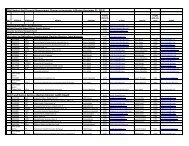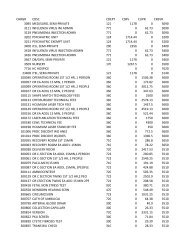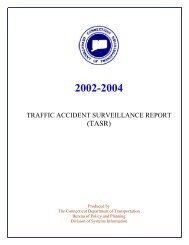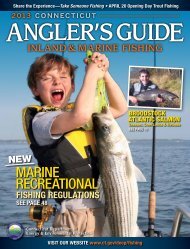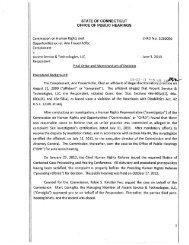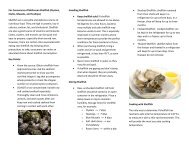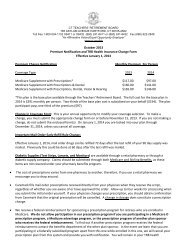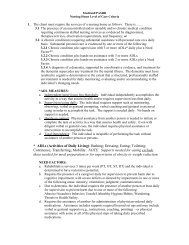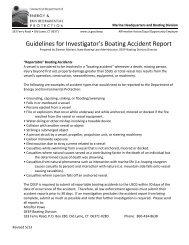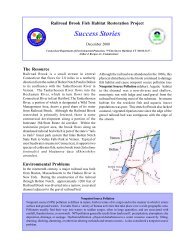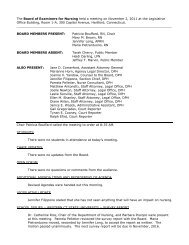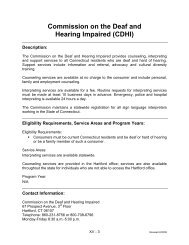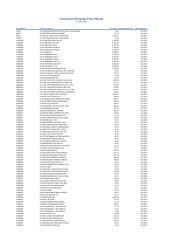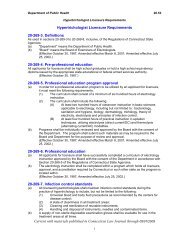Public Act 490 Guide - CT.gov
Public Act 490 Guide - CT.gov
Public Act 490 Guide - CT.gov
Create successful ePaper yourself
Turn your PDF publications into a flip-book with our unique Google optimized e-Paper software.
MARITIME HERITAGE LAND CLASSIFICATION<br />
SE<strong>CT</strong>ION 8: MARITIME HERITAGE LAND CLASSIFICATION<br />
Section 12-120f of the Connecticut General Statutes<br />
allows for the classification of certain waterfront land as<br />
maritime heritage land. When a town’s assessor approves<br />
the classification, the value of the land for property tax<br />
purposes is an assessment based on its use value, rather<br />
than its fair market value.<br />
"Maritime heritage land" means that portion of waterfront<br />
real estate owned by a commercial lobster fisherman<br />
licensed by the Connecticut Department of Environmental<br />
Protection, pursuant to Title 26 of the Connecticut General<br />
Statutes, which the fisherman uses exclusively for<br />
commercial lobstering purposes.<br />
In the calendar year prior to submitting an application<br />
for maritime heritage land classification, an applicant must<br />
derive at least 50% of their federal adjusted gross income<br />
from commercial lobster fishing.<br />
The Office of Policy and Management prescribes the<br />
eligible commercial lobster fisherman must file an application<br />
with the assessor of the town in which the fisherman<br />
owns waterfront land. The filing period is between<br />
September 1 and October 31, except in an assessment<br />
year in which a revaluation of all real property is effective<br />
in a town, in which case the end of the filing period is<br />
December 30. A person who fails to file this application in<br />
the proper manner and with the proper form during the<br />
filing period waives the right to claim maritime heritage<br />
land classification as of the October 1 assessment date in<br />
that year.<br />
At the time the application for maritime heritage land<br />
classification is submitted to an assessor, the applicant<br />
must provide the assessor with the following: (1) a copy<br />
of the license that the Connecticut Department of<br />
Environmental Protection issued that allows the applicant<br />
to engage in commercial lobstering, (2) a copy of the<br />
applicant’s federal income tax return for the prior calendar<br />
year, (3) proof of the income the applicant derived in that<br />
year from commercial lobstering, and (4) a map of the<br />
land on which the area used for commercial lobster fishing<br />
is shown.<br />
Assessors determine what constitutes satisfactory<br />
proof of income from commercial lobster fishing. Taxpayers<br />
should contact the assessor of the town in which<br />
the waterfront property is located to ascertain the type<br />
of proof the assessor requires and for information on<br />
how to obtain a map on which to show the land area used<br />
for commercial lobster fishing.<br />
Each assessor is responsible for determining the eligibility<br />
of land for maritime heritage land classification and<br />
its use value. Land beneath a building, structure or other<br />
real property improvement that an eligible taxpayer uses<br />
solely for commercial lobstering is eligible for classification.<br />
Land beneath a building, structure or improvement that<br />
the taxpayer uses for any other purpose is ineligible. If the<br />
taxpayer owns or uses only a portion of waterfront land,<br />
classification is available only for that portion.<br />
A taxpayer aggrieved by an assessor’s determination<br />
regarding an application for maritime heritage land<br />
classification, has the right to request a hearing before the<br />
town’s board of assessment appeals.<br />
Under Connecticut state law, the payment of a tax in<br />
addition to the real estate conveyance tax may be applicable<br />
if there is a sale or transfer of title to classified<br />
maritime heritage land within ten years from the date the<br />
assessor approves the classification. This additional tax is<br />
also applicable if the use of the land changes to other<br />
than maritime heritage land, within ten years of the date<br />
of a taxpayer’s acquisition of title to property for which an<br />
assessor approves the classification.<br />
Maritime land classification ceases at the time of a<br />
property sale, transfer of property title or change in<br />
property use, even if the additional tax is not applicable.<br />
A taxpayer must file a revised classification application if<br />
any of these situations occur.<br />
20<br />
<strong>Public</strong> <strong>Act</strong> <strong>490</strong>: A Practical <strong>Guide</strong> and Overview • http://www.cfba.org/pa<strong>490</strong>guide.htm • Connecticut Farm Bureau Association



